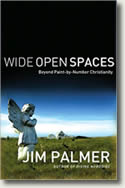Monday, November 22
You have your heads in your Bibles constantly because you think you'll find eternal life there. But you miss the forest for the trees. These Scriptures are all about me! And here I am, standing right before you, and you aren't willing to receive from me the life you say you want.
—John 5:39-40
NIV
One unfortunate thing related to writing books about God is it brings people out of the woodwork who want to debate and argue. There seems to be a pattern that goes something like this:
- Person A believes they are right about God.
- Person B holds different beliefs about God than those of Person A.
- Person A tells Person B they are wrong and reviles them.
- Meanwhile, Persons C, D, E…Z are eavesdropping and conclude the whole God thing must be a bust.
People seem to have a doctrinal litmus test by which others are either accepted or condemned. I must admit there was a string of years when I was eager to take on theological debates.
After I received my Masters of Divinity degree, I was confident I was "right" about most things related to God. I felt a sense of security in this, even pride. In some strange way I found worth and value in being "right," which meant there had to be a bunch of people who were "wrong."
One day someone asked me, "Jim, tell me what you know about God from personal experience?" Instinctively I began spouting off all my seminary doctrine. Several minutes into my theological answer, the person stopped me and explained the original question. "No Jim, what I mean is, who have you come to know God to be based on your direct interaction with him—not from what you've read or been told about God but from your personal experience of him?”
That got me thinking, is God something I can get "right" or "wrong" or is God something experienced in relationship? I guess I could create a set of statements that describe the essential facts about my wife, Pam, believe them, and call that "marriage."
However, it's much more enjoyable and meaningful to have a day-by-day personal and interactive relationship with her. I can construct a list of "right" doctrines about God, believe them, and call that "Christianity." However, I think I'd rather know God personally and intimately, whatever you call it.
There's something in me that feels like I should add a bunch of caveats saying how important it is to actually have the "facts" about God "right." However, if we have a relationship with God, wouldn't it follow that God would lead and guide us accordingly? Would God lead us into falsehood and lies? Didn't Jesus say his Spirit within us would guide us in all truth?
God, I don’t want to know you like algebra; I want to know you like an intimate companion. Amen.
These Signposts originally appeared on explorefaith in 2006.




